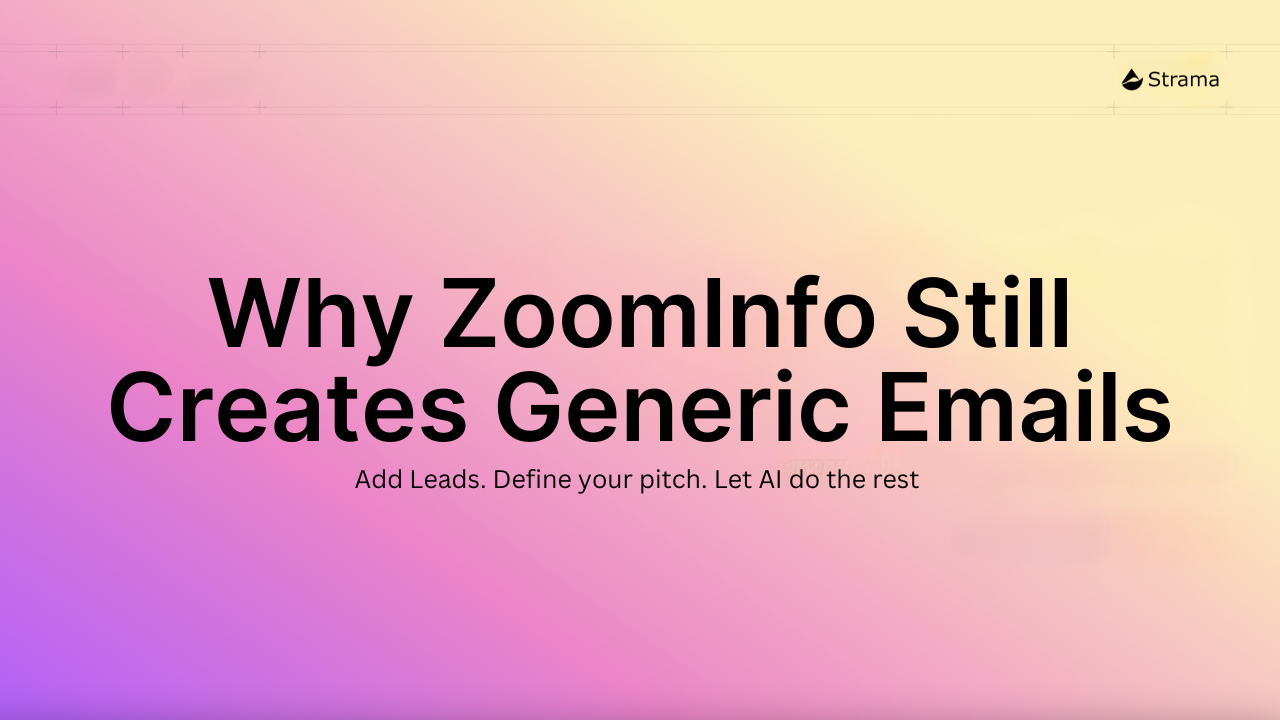Friday, September 12, 2025
Why ZoomInfo's 250M Contacts Still Generate Generic Emails


ZoomInfo pitched an energy management platform to someone who already bought it five years ago. With access to 250 million contacts and billions of data points, this shouldn't happen. Yet it perfectly represents what every major sales platform produces today.
A customer recently ran an experiment to understand why. They fed identical company information to both ZoomInfo and Strama to see what each platform would produce. The results expose why the entire sales tool industry sits on a goldmine of data but processes it like a 1995 mail merge.
The Great Data Waste
Here's what ZoomInfo produced with all that data:
Email 1: Hello Name, Company currently has 11 product sites online for Company in Texas. These sites have been operational for up to 5 years… Our platform provides intuitive control and data access to help facility managers like yourself effectively manage energy consumption…
Email 2: Keeping facilities running smoothly while managing energy usage and maintenance workflows can be a real challenge. I noticed Company has been focused on controlling costs…
Five emails later, ZoomInfo was still pitching energy management solutions to someone whose company already uses them. Despite having access to the vendor relationship data, the platform treated an existing customer as a cold prospect.
Salesloft, Outreach, Apollo—they all produce the same result: data-rich templates that reveal fundamental misunderstanding of business context. The absurdity lies in the contrast—incredible intelligence about prospects producing incredibly generic output.
Why Executives See Through Template Thinking
According to Instapage research, 63% of recipients never respond to non-personalized emails. Yet platforms continue to confuse data insertion with personalization.
Executives evaluate vendor credibility through specific signals: relevant expertise, understanding of their business challenges, and demonstration of research. When ZoomInfo generates companies like yours language for someone managing a unique 550+ site portfolio, it immediately signals the lack of genuine understanding.
Research from Martal shows that business-focused language drives 2-3x higher response rates than feature-focused messaging, with a 35% improvement in deal velocity. Yet the platform defaulted to generic facilities management pitches rather than addressing the prospect's specific role as a standardization leader across multiple regions.
These emails feel almost personal—they include real data points and specific company information—but executives detect the template structure immediately. With 95% of cold emails failing to generate replies, the cost of this approach becomes clear.
Same Data, Different Intelligence
Using identical information, Strama produced a fundamentally different approach:
Email 1: Scaling a proven solution at Company - Hey Name, I saw your role involves implementing facilities management best practices across Company's 550+ sites in the Central Region. For the last 5 years, vendor has had 11 of your Texas sites running on our platform. Since you already have a proven, successful solution within the company, I thought you might be interested in its potential for standardization.
The difference is immediately apparent. Rather than pitching energy management to an energy management buyer, Strama recognized an internal expansion opportunity. The platform understood the prospect's role context—standardization across a large portfolio—and positioned accordingly.
Email 2 referenced their past success: I noticed your past successes in driving significant cost reductions, like the two million dollar reduction at Previous Company. Imagine achieving similar results by expanding on Company's existing platform footprint.
Email 3 addressed vendor lock-in concerns specific to their industry: One challenge we see with large portfolios is the pain of being locked into obsolete, proprietary systems—like the issues Company experienced with an older legacy system.
Email 4 connected to the company's public sustainability commitments: I was thinking about Company's public commitment to achieve carbon neutrality by 2035. A key part of that is a data-driven approach to reducing Scope 2 emissions in your facilities.
Each touchpoint built on the previous one, demonstrating progressive understanding of the prospect's priorities and challenges. This isn't better copywriting—it's contextual intelligence applied to the same data points ZoomInfo accessed.
The Industry's Template Prison
The sales tool industry has created a paradox: the more data they collect, the more generic their output becomes. This happens because platforms were architecturally designed around template thinking.
The result is what industry experts call the fifty billion dollar data waste problem. Sales tools collect unprecedented intelligence about prospects but process it through systems designed for mail merge functionality. According to recent research, only 5% of senders actually personalize every message, primarily because current tools make true personalization impossible at scale.
Even sophisticated AI implementations focus on improving template selection rather than understanding business relationships. They can identify buying signals and trigger sequences but cannot recognize that pitching your existing vendor might not be the optimal approach.